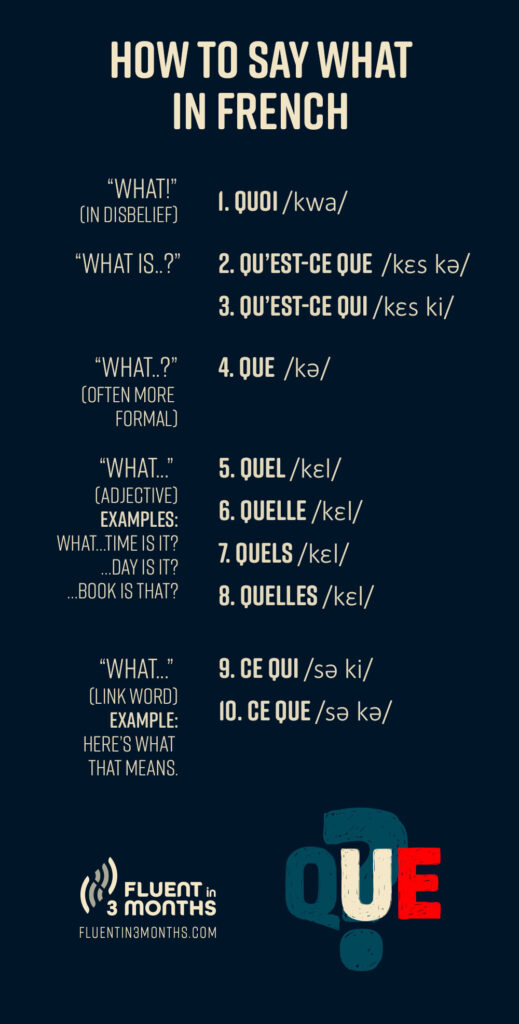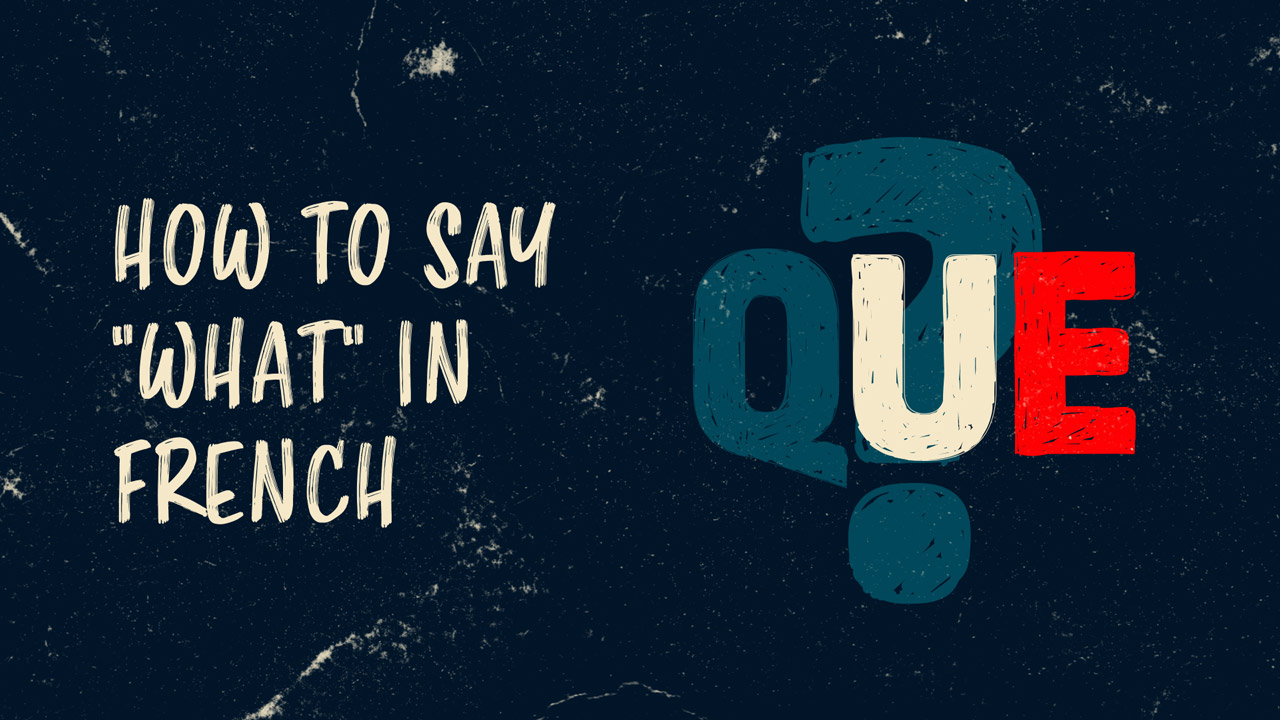How to Say What in French [with Audio]
How do you say “what” in French?
Beginners will definitely know quoi and que mean “what” in French while more advanced learners will also be familiar with ce que and ce qui. Yes, there is more than one way of saying “what” in French!
It might sound a bit complicated but once you understand the logic behind them, it does get easier.
When I was learning French, it took me a while to distinguish between ce que and ce qui, and sometimes quoi and que. Instead of long grammar explanations, I found it easier to look at example sentences or listen to French songs where I could hear the words in context.
So in this article, I outlined the different ways of saying “what” in French with relevant example sentences. I’ve also included audio so you can practice your pronunciation.
Table of contents
What in French (Chart with Audio)
Let’s start with a quick summary to familiarize ourselves with the pronunciation of “what” in French. Qu’est-ce que particularly looks complicated, but I assure you, its pronunciation is not! Keep in mind that French pronunciation isn’t phonetic — look at quel, quelle, quels, and quelles in the table. Although they are written differently, they sound the same.
| English | French | Pronunciation | Audio |
|---|---|---|---|
| “What!” (in disbelief) | 1. Quoi | /kwa/ | |
| “What is..?” | 2. Qu’est-ce que 3. Qu’est-ce qui |
/kɛs kə/ /kɛs ki/ |
|
| What..?” (often more formal) | 4. Que | /kə/ | |
| “What…” (adjective) Examples: What…time is it? …day is it? …book is that? |
5. Quel 6. Quelle 7. Quels 8. Quelles |
/kɛl/ /kɛl/ /kɛl/ /kɛl/ |
|
| “What…” (link word) Example: Here’s what that means. |
9. Ce qui 10. Ce que |
/sə ki//sə kə/ |

How to Say What in French
Below, you’ll find when to use each word. Make sure to check the example sentences as they will also be useful for daily-life vocabulary.
1. Quoi: The “What” Used in Disbelief, After Prepositions, and With Direct Objects
There are different ways of using quoi in French. The first one is similar to the English “what?” you say when you’re expressing disbelief or surprise. Take a look at this example dialogue between two friends:
- Lucie: Je me marie le mois prochain: “I’m getting married next month.”
- Manon: Quoi?! “What?” (Here, Manon expressed her surprise by saying quoi? as she didn’t know that Lucie was getting married.)
We also use quoi when “what” is the object of the question in everyday French, or with prepositions in more formal French. Here are some examples:
- Tu veux quoi pour ton anniversaire? “What do you want for your birthday?” (Informal, casual)
- Tu penses à quoi? “What are you thinking about?” (Penser is a verb that needs the preposition à, so we have to say à quoi instead of just quoi here.)
2. Qu’est-ce que/qui: The “What” in “What Is This?”
You might recognize the phrase qu’est-ce que from the song Psycho Killer — Psycho Killer, qu’est-ce que c’est?
Que in qu’est-ce que means what. Qu’est-ce que c’est, as a whole, means “what’s that.” You can use the phrase qu’est-ce que to ask about definitions, explanations, or clarifications. Sometimes, you might also see qu’est-ce qui instead of qu’est-ce que — that’s when the “what” refers to the subject of the sentence.
- Qu’est-ce que tu fais? “What are you doing?”
- Qu’est-ce que tu veux manger? “What do you want to eat?”
- Qu’est-ce qui se passe? “What is happening?”
3. Que: The “What” in Qu’est-ce que
When que is used alone, without attaching to est-ce que, it often leads to a question that requires inversion. Look at the difference between these sentences:
- Qu’est-ce que tu fais? “What are you doing?” (More straightforward)
- Que fais-tu? “What are you doing?” (More formal)
4. Quel/quelle/quels/quelles: The Adjective “What”
Quel has different forms: quel (masculine singular), quelle (feminine singular), quels (masculine plural), and quelles (feminine plural). This is because it acts as an adjective, agreeing with the noun that comes after it.
- Quelle heure est-il? “What time is it?”
- À quelle heure part le train? “What time does the train leave?”
- Quel jour on est? “What day is it?”
- Quelles couleurs aimes-tu? “What colors do you like?”
- Quels livres recommandez-vous? “What books do you recommend?”
You can also use quel/quelle/quels/quelles to express surprise in a way that it means “what” but is not a question. Luckily, there’s an exact translation in English: “What a…”
- Quel dommage! “What a shame!”
- Quelle belle surprise! “What a nice surprise!”
- Quel beau paysage! “What a beautiful landscape!”
- Quelle déception! “What a disappointment!”
5. Ce qui/ce que: The “What” Used to Link Clauses Together
Ce qui and ce que are not the “what” we use in questions. Think of them as the “what” in “here’s what that means.” Some examples will make it clearer:
- Voici ce que cela signifie. “Here’s what that means.”
- Je ne sais pas ce que tu vas faire demain. “I don’t know what you’ll do tomorrow.”
- Montre-moi ce que tu as acheté. “Show me what you’ve bought.”
- Ce qui compte vraiment, c’est la famille. “What really matters is family.”
Put Your French in Context
While example sentences do help, consider checking out books, podcasts, and courses to see these words in context. The more you expose yourself to French, the more naturally the right words come. Bonne chance!



Social